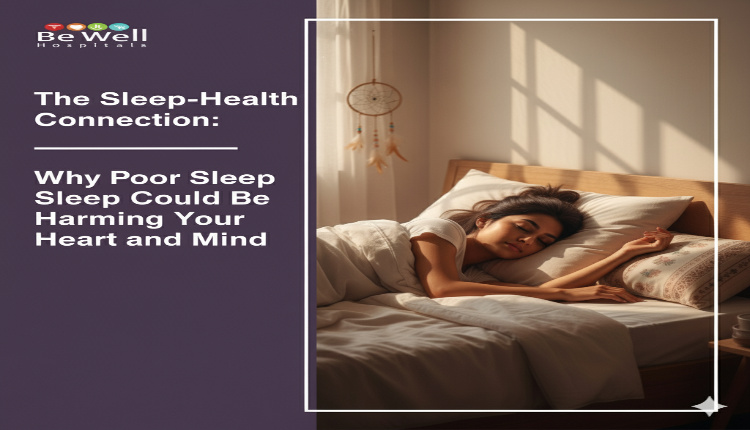
Sleep: The Most Overlooked Health Habit
We live in a world that celebrates late nights and early mornings. “I’ll sleep when I’m done” sounds ambitious – until your body starts to disagree.
The truth is, sleep isn’t a break from life; it’s how your body keeps you alive and balanced. When you sleep well, your heart, mind, and metabolism repair and reset. When you don’t, the damage slowly builds up in the background.
Why Sleep Is So Crucial
Think of sleep as your body’s in-built maintenance system.
While you rest:
- Your heart rate and blood pressure stabilize.
- Your brain clears out toxins and processes memory.
- Your hormones regulate, affecting appetite, mood, and energy.
- Your immune system strengthens.
Skipping or shortening this daily reset can throw your entire system off balance – even if you “feel fine” at first.
How Poor Sleep Affects Your Heart
Your heart works 24/7. Sleep is the only time it gets a lighter load. When you regularly cut sleep short, stress hormones stay elevated, keeping your heart rate and blood pressure higher than normal.
Over time, that constant strain can contribute to high blood pressure, irregular heartbeat, and reduced cardiovascular recovery.
Even mild sleep deprivation – say, 5–6 hours a night – can impact circulation and increase the risk of heart-related issues later in life. Simply put, good sleep is as important for your heart as good food and exercise.
How Poor Sleep Affects Your Mind

Your brain never truly shuts down – it recharges. During deep sleep, your brain sorts memories, resets mood, and clears waste. When you skip proper rest:
- Concentration drops.
- Decision-making becomes harder.
- Mood becomes unstable.
- Anxiety and irritability increase.
Ever noticed how small problems feel bigger after a sleepless night? That’s not coincidence – it’s biology.
Long-term lack of sleep can dull creativity, slow reaction time, and even increase the risk of mental burnout.
What Disrupts Sleep Quality
Poor sleep isn’t always about insomnia. Often, it’s lifestyle-driven.
Here are common culprits:
- Late-night screen exposure and scrolling
- Caffeine or heavy meals close to bedtime
- Stress and mental clutter
- Irregular sleep timings
- Lack of physical activity during the day
Recognizing these patterns is the first step to fixing them.
How to Improve Sleep Naturally
You don’t need supplements or sleep trackers to start sleeping better – just consistency and simple tweaks.
- Set a fixed schedule. Go to bed and wake up at the same time daily.
- Create a wind-down ritual. Read, stretch, or listen to calming music before bed.
- Keep screens away. Blue light signals your brain to stay awake.
- Make your room a sleep zone. Cool, dark, quiet.
- Limit caffeine and heavy dinners. Especially within 3–4 hours of bedtime.
- Stay active. Even light exercise during the day helps your body rest better at night.
- Manage stress. Try mindfulness or slow breathing before bed.
Good sleep isn’t built overnight – it’s trained through rhythm.
When to Pay Attention
If poor sleep continues for more than a few weeks – or it’s affecting your mood, focus, or relationships – it’s time to check in with a doctor. Sometimes the cause could be related to stress, lifestyle, or sleep disorders that need guidance.
The Bigger Picture
Sleep connects every system in your body. It fuels your heart, sharpens your mind, and strengthens your immunity.
Ignoring sleep is like skipping maintenance on a car you drive every day – it runs fine for a while, then suddenly doesn’t.
Making sleep a priority isn’t laziness; it’s longevity.
Conclusion
- Sleep is not optional – it’s essential for heart and mental health.
- Poor sleep can increase stress, affect blood pressure, and reduce focus.
- Regular routines, screen-free nights, and balanced lifestyle choices can restore sleep quality.
If your nights feel restless and your days feel heavy, it’s time to take your sleep seriously.
Start with small changes – a routine, calm evenings, mindful breaks.
And if sleep troubles persist, get a simple health check to understand what’s affecting your rest.
